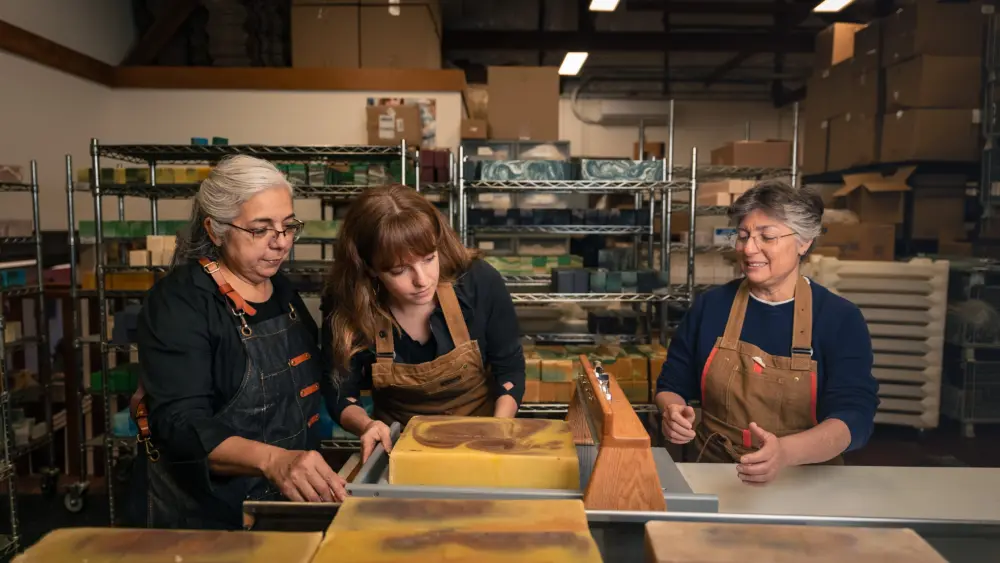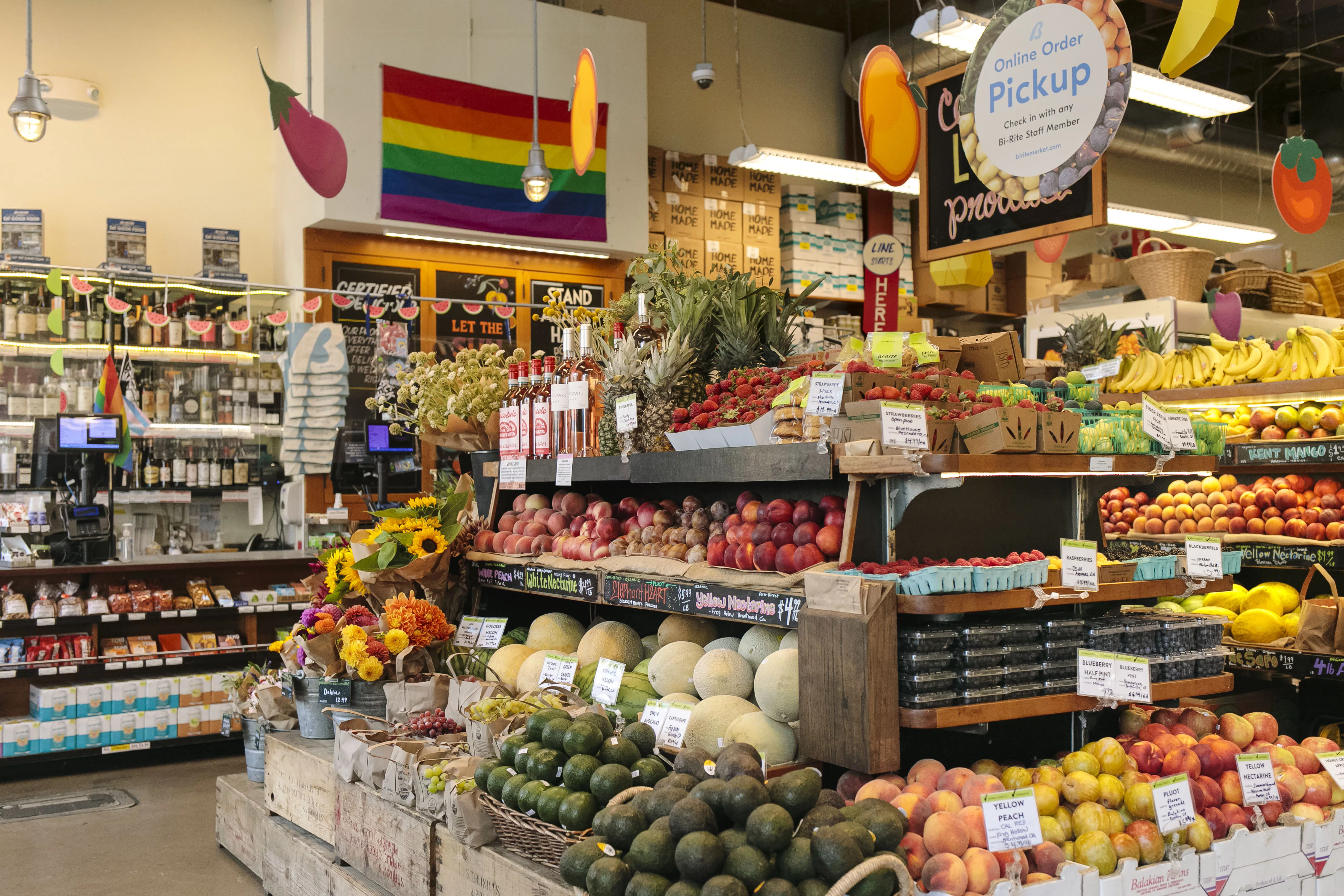
Bi-Rite Market Divisadero in San Francisco sells many North Bay products, including Clover Sonoma dairy products and Petaluma Egg Farm eggs. [Photo courtesy Bi-Rite family of businesses]
The reach of North Bay grown and made foods is deep and complex, extending through distributors to grocers and restaurants far beyond where the foods are created in Napa and West Marin. The efforts of North Bay ranch owners and local markets help, as do the ideas of venue and grocery managers in the East Bay and San Francisco.
The common goal is to share North Bay products and stories with a wider audience.
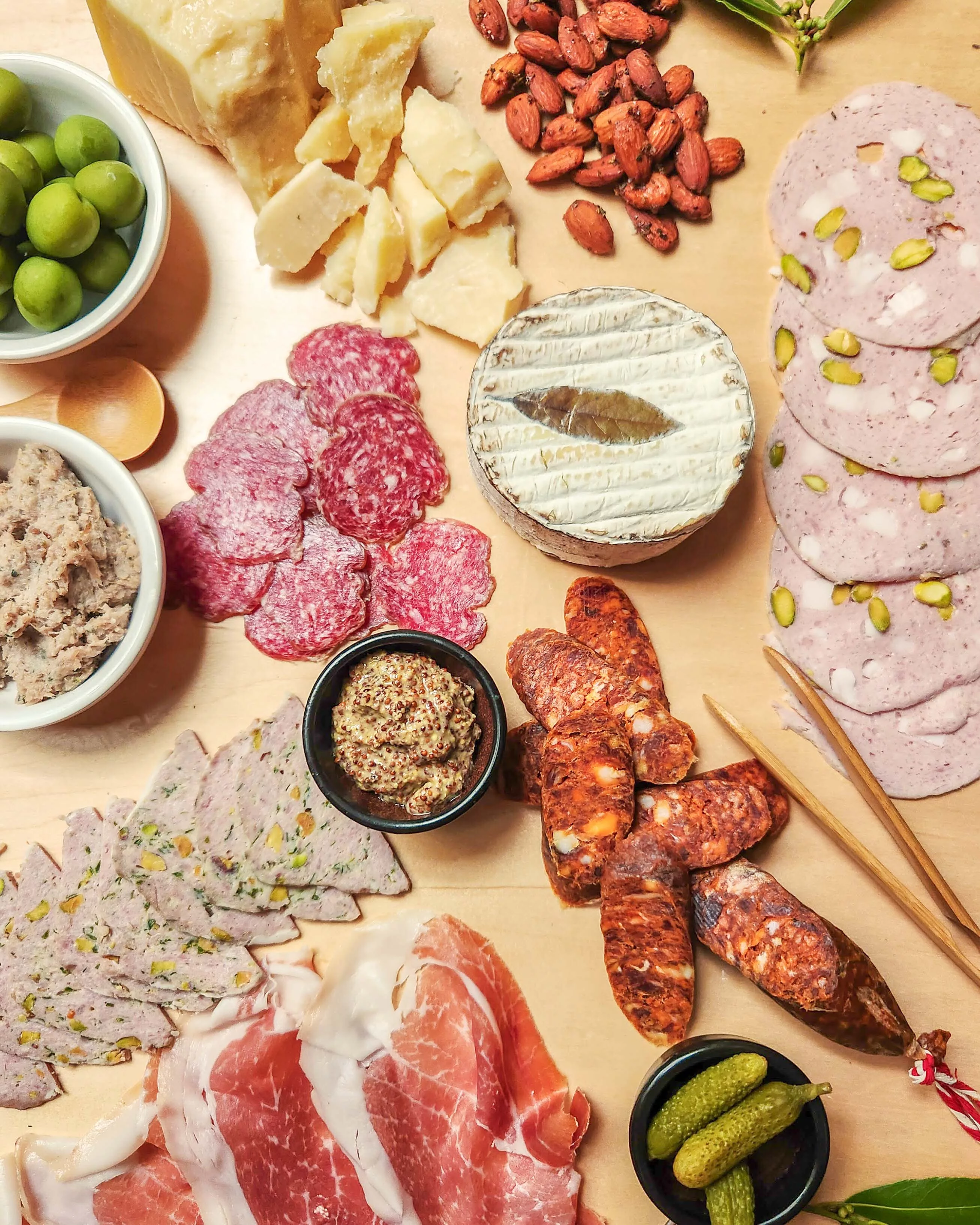
“Shoppers are always impressed when we mention how close many of the purveyors are. Educating through events, partnering with shops and offering special tastes are great ways to get the word out on North Bay products,” says Jane Connors, general manager of the San Francisco Ferry Building.
For example, the list of North Bay foods at the Ferry Building includes meats from Fatted Calf, which also has a location in Napa; sweet and savory empanadas from El Porteño, which too also has a location in Napa; raw, cold-pressed juices and kombucha from Juice House Co., which has locations in Benicia, Emeryville, Napa and Petaluma; and oysters from Hog Island Oyster Company, which has locations in Marshall, Napa, Petaluma and the San Francisco Ferry Plaza Farmers Market.
“Perhaps the next trend is food tasting tours of a region, a map of essential shops or places to taste the flavors of the North Bay. I love the idea of a Taste the North Bay ferry ride. Of course [this would start] at the Ferry Building with a healthy offering from Juice House and an El Porteño empanada,” says Connors.
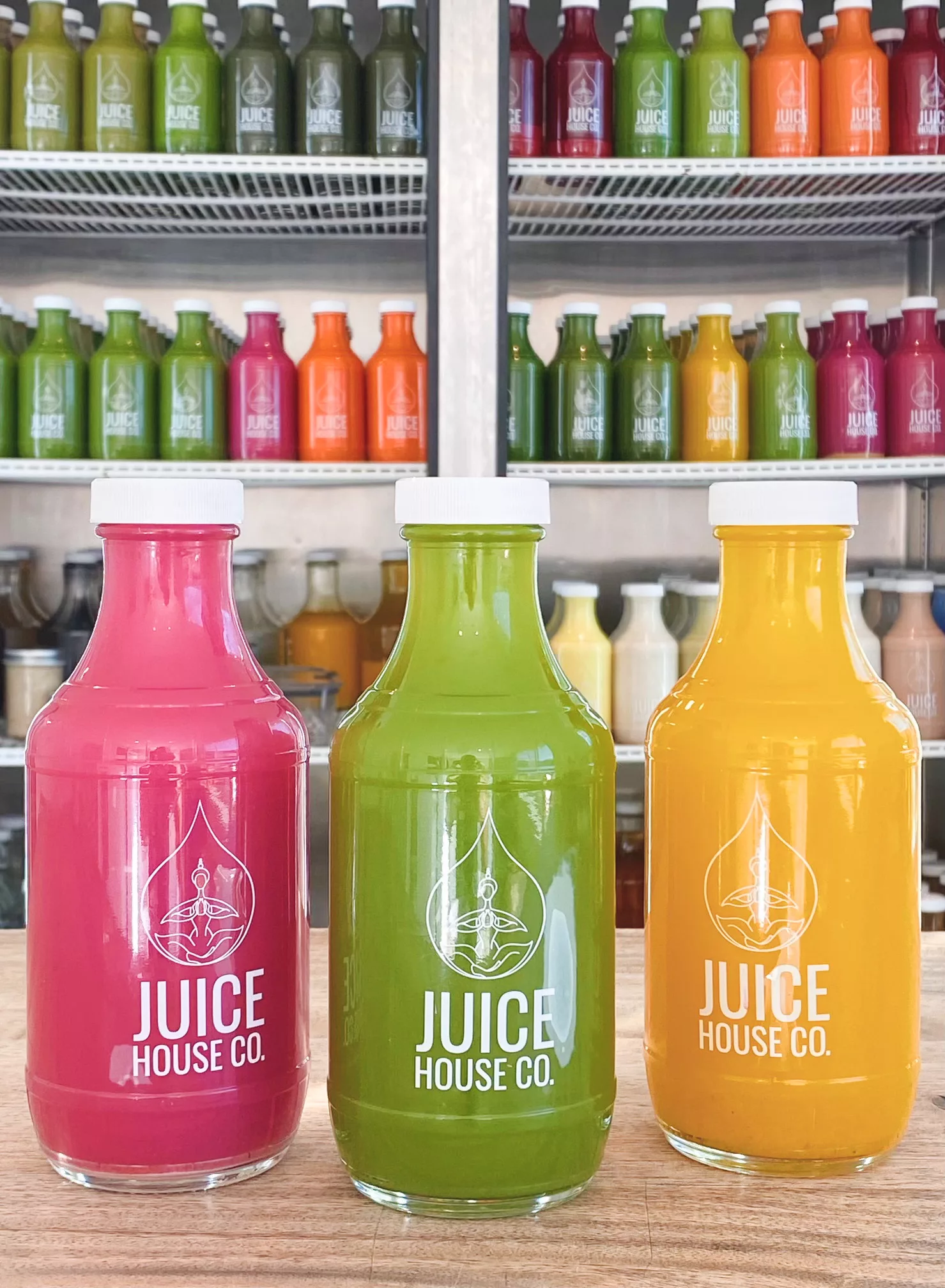
Joe Pozzi, owner of Pozzi Ranch Lambs in Valley Ford, says product demos, on-site tours and visits to stores are time-tested tools that other North Bay producers can borrow.
“After you showcase a great product, the challenge becomes coordination. How can you get the product to the buyer on time, in excellent condition? Then you need to maintain that relationship. My advice is to find time to hear from the people who have direct contact with the customers, like the grocer’s butcher. That way you know what feedback the customers give and how they’re using the product,” says Pozzi.
How Bay Area grocers view North Bay products
There is no set list of all the foods North Bay companies provide the Bay Area. Producers are always adjusting their offerings and scope of distribution. There is also not a set volume of foods that producers supply. This depends on the quality of their harvests, shifts in demand, the price of fuel and transportation and seasonal availability of the ingredients producers use.
Yet the array of North Bay products that are distributed throughout the Bay Area is extremely diverse. It includes overnight oats made by Luv Snacks in Napa, crabs caught by Bodega Bay fishermen, edible flowers from Sebastopol Microgreens and pies made by Kozlowski Farms in Forestville. The latter product, a long-time favorite in the North Bay, is now also available in independent grocery stores like Guerra Quality Meats in San Francisco as well as markets in Lake and Mendocino counties.
Although it is difficult to estimate the amount of North Bay foods sold and the income they generate, it is easy to confirm that the North Bay makes an enormous contribution to the Bay Area’s culinary scene. The North Bay contributes to both the quality and quantity of raw ingredients available to chefs and home cooks across the Bay Area.
For example, Berkeley Bowl, an independent grocer with two large stores in Berkeley, purchases from roughly 270 vendors in the North Bay. The list is mostly composed of companies that make or distribute wine. But names of vendors also include other prepared product makers, from Biotic Beverages LLC in Occidental—a maker of organic kvass, a fermented dairy drink—to Judy’s Breadsticks in Mill Valley, which makes bread and breadsticks. In addition, the list includes suppliers of raw ingredients, such as Bay Area Bee Company in Bolinas, which produces honey, and Sebastopol Berry Farm, which grows everything from blueberries to orange raspberries.
A number of companies on the list sell several lines of products, like Marin Sun Farms in Petaluma. This business produces eggs, poultry and a range of grass-fed and pasture-raised meats, including goat and pork.
Berkeley Bowl sources from the North Bay to offer locally made products to customers in support of other small businesses and local communities.
“At Berkeley Bowl Marketplace, we also do our best to engage in practices that are environmentally responsible and supportive of our community. That means sourcing our products locally when possible, to reduce our impact on the environment that is associated with transporting products around the country,” says Chi Dixon, marketing and communications manager for Berkeley Bowl.
Berkeley Bowl’s partners include Stemple Creek Ranch, a Tomales ranch that provides the stores with grass-fed and grass-finished beef, and Clover Sonoma, a Petaluma company that is one of the store’s primary dairy providers. Clover Sonoma supplies the company with Berkeley Bowl private label milk along with Clover-branded products.
Berkeley Bowl’s eggs come from the store’s own private flock in Petaluma. The store partners with a farmer who tends a separate commercial flock as well.
Berkeley Bowl sees few transportation concerns because of the proximity of Berkeley to the North Bay.
“There are no real challenges aside from general lack of awareness of individual vendors who may be creating incredible products,” says Dixon.
North Bay producers may want to set a goal to explain what they can accomplish and why foods from the region can be superior. There are challenges with this because customers tend to request items based on categories, such as gluten-free cookies. Usually they don’t include the region, like gluten-free cookies from the North Bay, in a description.
“[The exception is if] there’s a specific brand they are asking for. But the emphasis is typically not specific to the counties,” says Dixon.
Berkeley Bowl’s buyers always keep an eye out for items they think the store’s customers will like.
“When an individual product has a good story, we share it with our customers across social media and in-store,” says Dixon.
The Bi-Rite family of businesses, which is based in San Francisco, sells a wide range of North Bay products as well. Bi-Rite has three market locations and a creamery that offers ice cream in San Francisco. It also has a catering office and commissary kitchen in San Francisco that serves the city, the peninsula down to Palo Alto and parts of the East Bay and Marin County.
“Shoppers are always impressed when we mention how close many of the purveyors are.”—Jane Connors, GM of the San Francisco Ferry Building
North Bay products at Bi-Rite markets include those made by Clover Sonoma, Straus Family Creamery in Petaluma, Nicasio Valley Cheese and Farms in Nicasio, Petaluma Egg Farm in Petaluma, Point Reyes Farmstead Cheese Company in Point Reyes Station, Cowgirl Creamery in Point Reyes Station and Tomales Bay Foods in Petaluma.
“Apples from Devoto Gardens & Orchards [in Sebastopol] are a seasonal must-have. We love Stemple Creek Ranch, Liberty Ducks [in Petaluma] and Fatted Calf. For snacks and crackers, Rustic Bakery [with four locations in Marin], Little Apple Treats [in Sebastopol] and Comet Corn [in Santa Rosa] have coveted shelf space,” says Jamie Nessel, director of product and purchasing for the Bi-Rite family of businesses.
Bi-Rite has been committed to sourcing locally since the company was founded in 1964.
“It’s natural that we work with so many great food brands from the North Bay. These have been incredibly solid, reliable relationships that go back many, many years,” says Nessel.
She adds Bi-Rite’s customers love local products in general and are excited to have multiple options from the North Bay.
“We’re always on the hunt for hot new local products,” says Nessel.
Independent grocers like Berkeley Bowl and Bi-Rite Markets become familiar with new items in different ways.
Most of Berkeley Bowl’s new products are introduced to the company through food shows like the Good Food Mercantile San Francisco, which is typically held in September, and Natural Products Expo West, an annual food show in Anaheim that is typically held in March. Berkeley Bowl also sees vendors reach out through distributors, partners and existing vendors.
“Sometimes employees will even bring items they like to the attention of our buying team. However, for smaller vendors it can be challenging to gain attention among the noise at a big show. Participation in some of these shows as a vendor can be prohibitive. For our stores specifically, we have a vendor-submission page on our website that allows vendors to submit their product information for consideration,” says Dixon.
The Bi-Rite team attends the Good Food Mercantile San Francisco as well. Yet it also goes on “discovery tours” outside San Francisco, such as one of its recent trips in Sausalito, Mill Valley, Corte Madera and Tiburon, “stopping by our friends at Good Earth Natural Foods [in Fairfax] along the way,” says Nessel.
These visits reveal how North Bay stores like Oliver’s Markets in Sonoma County and Sunshine Foods in St. Helena help North Bay producers. Serving as a brick-and-mortar showplace for new North Bay foods might be enough. Yet North Bay grocers do even more when they create or allow informative displays that explain the origin and key staff of local producers.
Large venues like the San Francisco Ferry Building also sometimes bring their teams to North Bay stores.
“Many years ago, we did a team-building event and stopped at a variety of shops who were headquartered in the North Bay. It was transformative to my team. They were so impressed with the flavors, the practices of each business and how close everything was,” says Connors.
Producers’ stories, from plant-based dairy to mushrooms
North Bay producers have an easier path to explain their company when they have a long history and several lines of product, as Manzana Products Co. in Sebastopol. Newer companies and companies that offer only a few products can learn from these businesses’ practices.
Sharing stories is one of the most effective strategies to teach consumers. A producer can feature the products, ingredients, origin and methods to make the products. Stories are also a way to put faces to the names of founders and other key staff.
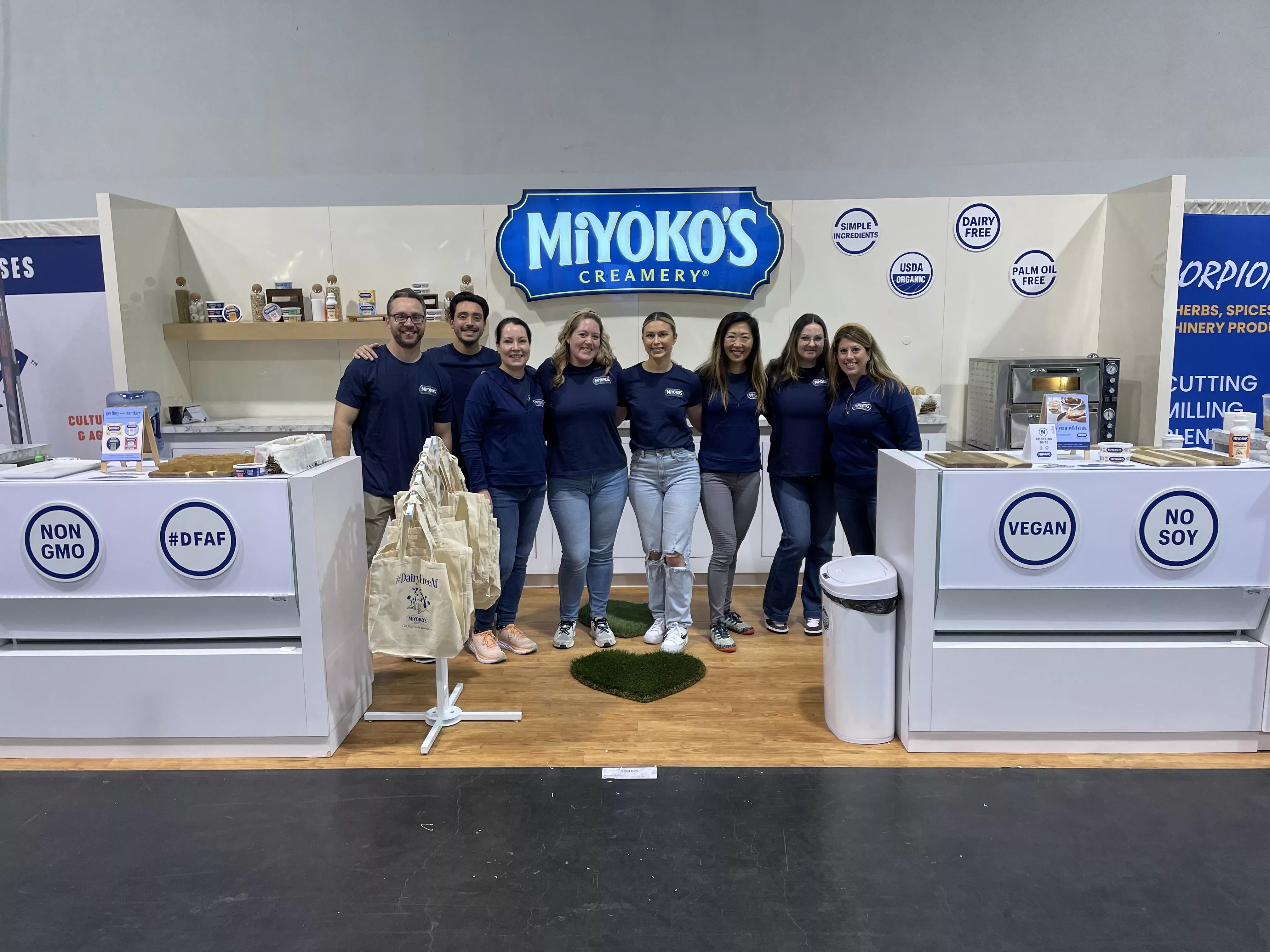
“[There are also] call-outs of our products on some menus saying “using Miyoko’s vegan cheese.” All information is pointed back to our website,” says Stuart Kronauge, CEO of Miyoko’s Creamery.
Miyoko’s currently distributes its products to Grocery Outlet, Lucky, Nugget Markets, Raley’s, Safeway, Sprouts, Target and Whole Foods locations throughout the Bay Area. The company also sells to independent natural and specialty retailers.
“We want to continue to expand in conventional grocery and local restaurants and bakeries,” says Kronauge.
Providing information to a grocer’s staff is another method of engaging customers. One of Bi-Rite’s favorite ways to share producer and product information is through staff education.
“We have regular ‘taste it’ sessions where staff get to try items. [There they] learn about where they’re made, who makes them and why they’re so delicious. Any time a staff member can personally describe how something tastes or is inspired by a producer’s story, they’re naturally more excited to share that experience and information with our guests. It’s those honest conversations that we love having with our guests,” says Nessel.
Mycopia Specialty Mushrooms, a Sebastopol-based producer founded in 1977, has a long history of distribution and partnership in the Bay Area.
Mycopia products can be found at Mollie Stone, Nugget Markets, Sprouts, Whole Foods and independent natural food stores throughout the Bay Area, says Justin Reyes, manager of sales and marketing at Mycopia,
“Our most popular item is our eight-ounce Chef Sampler retail pack that contains an assortment of three types of specialty mushrooms. Our maitake, aka Hen of the Woods [mushroom], is also some of the best around,” says Reyes.
Mycopia works closely with its wholesale and retail partners to provide information and recipes that utilize its mushrooms. The company shares recipes that work well for professional chefs and home cooks.
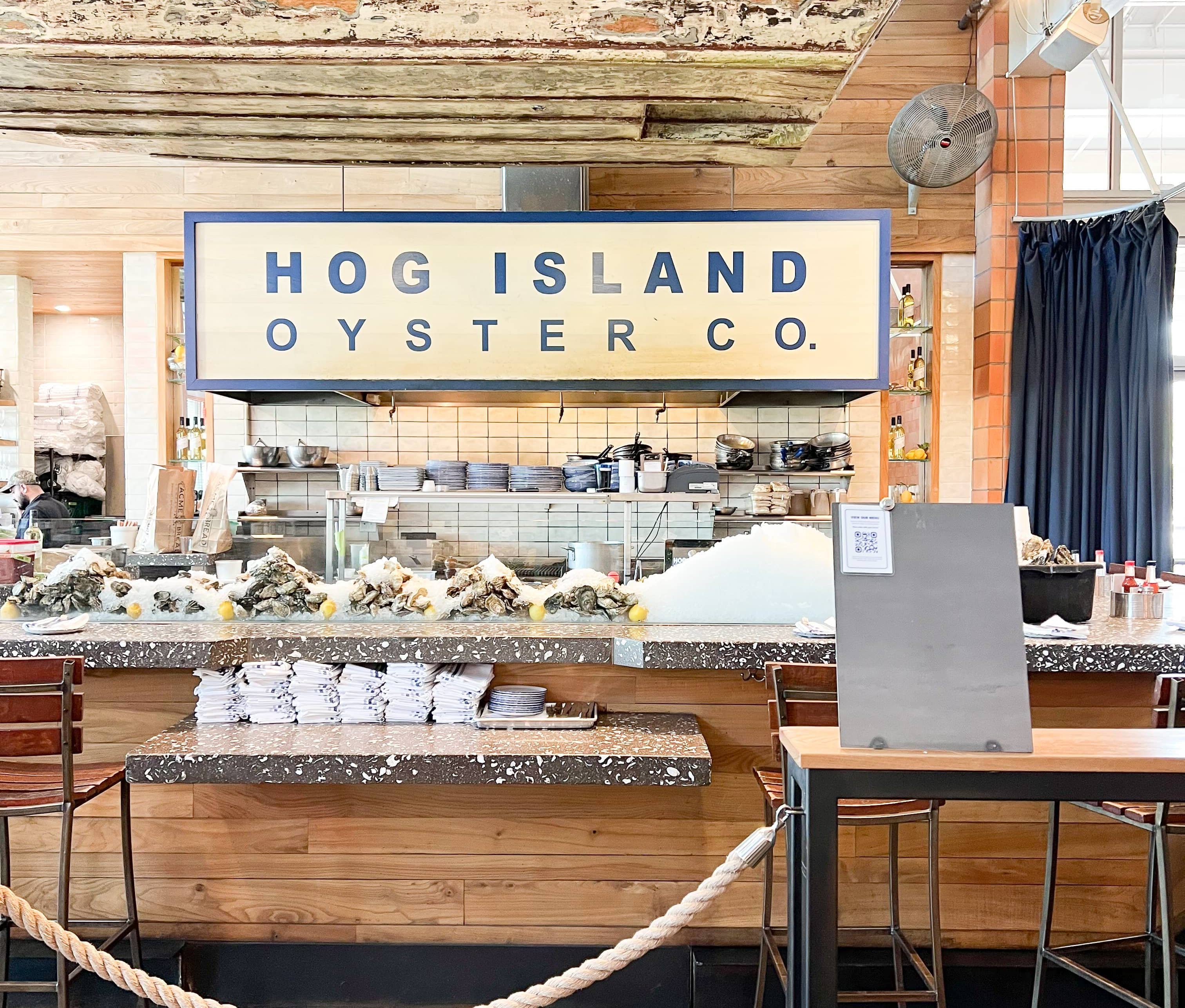
A North Bay producer can even see an advantage in sharing aspects about its delivery operations. For example, Hog Island Oyster Co. brings oysters to the Ferry Building every day. Storage for the shops at this space is extremely minimal. This means the frequency of deliveries for the producer is a good topic for a story because it highlights freshness.
Another valuable story to tell is which products have the highest sales. Miyoko’s popular products in the North Bay and the entire Bay Area include Euro Salted Butter, Plain Cream Cheese and Fresh Mozzarella. It can be entertaining and informative for a producer to explain how a trend started in the North Bay, where the product may have been offered first and later spread south and east.
Younger generations especially will be interested in stories about how North Bay producers engage with consumers online. For example, Miyoko’s utilizes its company website as well as email marketing campaigns, local events, geo-targeting efforts on social media, LinkedIn posts and distributor advertising.
Grocers can help producers in a unique way by highlighting the companies that donate products to charity. In this story, Nessel asked to give a special shout-out to Petaluma Egg Farm. She explains that every holiday season, Petaluma Egg Farm donates eggs to Bi-Rite’s Healthy Holiday Meal Box program. Through a partnership with Mo’Magic, a San Francisco nonprofit organization, the Bi-Rite program is able to provide a full holiday meal to 700 families in San Francisco every December.
A case study: North Bay lamb goes to Fresno
The story of Pozzi Ranch Lamb is a helpful example of how a North Bay business can influence markets far beyond the Bay Area.
Pozzi produces pasture-raised lamb without antibiotics or hormones. He also buys lamb from four other ranchers who follow these protocols.

Pozzi primarily sells to Whole Foods. The store has featured his products and operations on the Whole Foods blog.
“We’ve been selling lamb in partnership with Whole Foods for about 18 years. We have done hundreds of demos in their stores. I always look for opportunities to develop a relationship,” says Pozzi.
One way Pozzi has gained knowledge to share information about agriculture is by serving in local and national agricultural organizations. Pozzi is a member of the board of the Sonoma County Farm Bureau, the district manager for the Gold Ridge Resource Conservation District in Sebastopol and the treasurer of the American Sheep Industry Association, a national trade association based in Englewood, Colorado.
“My time at the ranch and working with these organizations taught me there are many opportunities to educate teams from grocery stores. I particularly like to share more about the environmental aspects of our operations, from the ranch’s role in maintaining grasslands to ways that we sequester carbon to minimize greenhouse gas emissions,” says Pozzi.
Pozzi adds that another, easy and effective tool to build relationships is holding a comfortable social gathering like a barbecue.
“There have been so many times that we’ve had consumers from Marin County Whole Foods stores put their business cards in a fishbowl. Then we picked out several winners and thanked them in person for buying our products. I highly recommend feel-good, thoughtful ways to invite business partners to the North Bay,” says Pozzi.
5 tips for North Bay producers to extend their reach
- Share information online. “The best way to connect and introduce yourself and your products to our team is through the submission form on our website,” says Jamie Nessel, director of product and purchasing for the Bi-Rite family of businesses.
- Encourage North Bay customers to share the products with friends, family and colleagues throughout the Bay Area. This may include developing and sharing recipes that feature specific North Bay products, like Gravenstein apples.
- Become involved in promoting local agriculture. “When you know the nuts and bolts of what’s going on, you speak with knowledge about local producers,” says Joe Pozzi, owner of Pozzi Ranch Lambs in Valley Ford.
- Find different angles to share stories about the origin of the products and the people who make them. Personal histories tie the products to the North Bay and encourage customers to buy from the region overall.
- Partner with local alcoholic beverage producers, including wineries, breweries and distilleries, that are interested in recommending North Bay products as good pairing options.
—Jessica Zimmer


